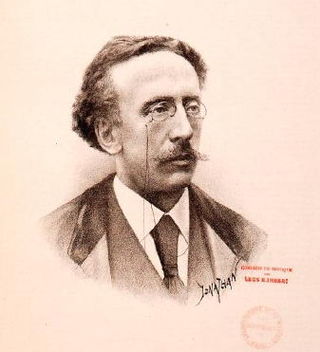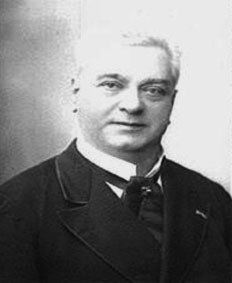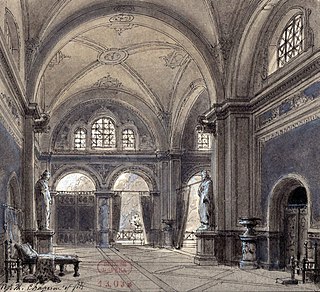
Alexandre Lapissida (9 March 1839, Volkrange - 16 February 1907, Paris) was a French operatic tenor, producer, director and theatre manager. [1]

Alexandre Lapissida (9 March 1839, Volkrange - 16 February 1907, Paris) was a French operatic tenor, producer, director and theatre manager. [1]
First singing at Strasbourg, he was taken on by Théâtre de la Monnaie in Brussels in 1868, where he spent most of his career. There he was made a régisseur in 1871 and served as the theatre's joint head with violinist Joseph Dupont from 1886 to 1889. [2] They then passed that position on to Stoumon and Calabresi. After that, Lapissida was taken on by the Opéra de Paris as régisseur général and producer. He produced the Opéra's main operas of the late 19th century including Le Mage by Jules Massenet (1891), Faust by Charles Gounod (1893), Salammbô by Ernest Reyer (1893), Otello by Giuseppe Verdi (1894), Frédégonde by Ernest Guiraud (1895), La favorite by Gaetano Donizetti (1896) and Les Huguenots by Giacomo Meyerbeer (1897). Lapissida seems to have left the stage by 1900.
Today, the Bibliothèque-musée de l'Opéra holds an important part of his correspondence in its "fonds Lapissida".

Georges-Léon-Jules-Marie Feydeau was a French playwright of the Belle Époque era, remembered for his farces, written between 1886 and 1914.

Alexandre Dumas fils was a French author and playwright, best known for the romantic novel La Dame aux Camélias, published in 1848, which was adapted into Giuseppe Verdi's 1853 opera La traviata, as well as numerous stage and film productions, usually titled Camille in English-language versions.

Jean Richepin was a French poet, novelist and dramatist.

Paul Armand Silvestre was a 19th-century French poet and conteur born in Paris.

Joseph Méry was a French writer, journalist, novelist, poet, playwright and librettist.

The name Théâtre de la Renaissance has been used successively for three distinct Parisian theatre companies. The first two companies, which were short-lived enterprises in the 19th century, used the Salle Ventadour, now an office building on the Rue Méhul in the 2nd arrondissement.

Henri-Joseph Dupont was a Belgian violinist, leader, theatre director (manager) and conductor. The pianist Auguste Dupont was his brother.

Pierre-Barthélemy Gheusi, also known by the pseudonym Norbert Lorédan, was a French theatre director, librettist, journalist and writer. He was born in Toulouse and died in Paris.

Émile-Alexandre Taskin, born in Paris on 18 March 1853, and died there on 5 October 1897, was a French operatic baritone mainly active at the Paris Opéra-Comique. He was a descendant of the harpsichord maker Pascal Taskin (1723–1793).

Henri Charles Antoine Gaston Serpette was a French composer, best known for his operettas. After winning the prestigious Prix de Rome as a student at the Paris Conservatoire, he was expected to pursue a career in serious music. Instead, he turned to operetta, writing more than twenty full-length pieces between 1874 and 1900. He accepted some conducting work and also served as a critic and journalist for a number of French newspapers and magazines.
Raymond Jean-Baptiste Ernest Carbonne was a French tenor and stage director who had a long association with the Opéra-Comique in Paris.

The Théâtre de Paris is a theatre located at 15, rue Blanche in the 9th arrondissement of Paris. It includes a second smaller venue, the Petit Théâtre de Paris.

Jean-Vital Jammes was a French opera singer. During a stage career spanning 40 years, he created many leading baritone roles, including Zurga in Bizet's Les pêcheurs de perles and Ourrias in Gounod's Mireille. Born in Le Passage d'Agen near the town of Agen, he was largely self-taught and made his stage debut in 1841 at the age of 16. After singing in several provincial theatres, he was engaged by the Théâtre Lyrique in Paris and later by the Opéra-Comique. Following his retirement from the stage, Ismaël lived in Marseille where he died at the age of 68.

Henri Valentino was a French conductor and violinist. From 1824 to 1832, he was co-conductor of the Paris Opera, where he prepared and conducted the premieres of the first two grand operas, Auber's La muette de Portici and Rossini's Guillaume Tell. From 1832 to 1836, he was First Conductor of the Opéra-Comique, and from 1837 to 1841, conductor of classical music at the Concerts Valentino in a hall on the rue Saint-Honoré in Paris.

Jules Brasseur (1829-1890) was a French actor and singer, born 1829 in Paris and died in the same city in 1890, who achieved considerable popular success in Paris and around France in the second half of the 19th century.

Maurice Ordonneau was a French dramatist and composer. The son of a merchant of eau de vie, Ordonneau was a prolific author in creating theatrical works. He composed, often with the collaboration of other playwrights, composers and musicians, a great number of operettas, opéra-bouffes, comedies and vaudevilles.

Frédégonde is an 1895 French opera in five acts with music by Ernest Guiraud, Camille Saint-Saëns, and Paul Dukas and a libretto by Louis Gallet based on Augustin Thierry's Récits des temps mérovingiens [Tales from the time of the Merovingians] (1840).

Paul Joseph Guillaume Hillemacher was a French composer and pianist.
Kassya is a French-language opera in 4 acts and 5 tableaux by Léo Delibes to a libretto by Henri Meilhac and Philippe Gille after a novella by Sacher-Masoch. Unfinished on Delibes' death in 1891, it was completed and orchestrated by Jules Massenet in 1893.

Dominique-Alexandre Parodi, known as Alexandre (Alessandro), was a naturalised French writer, poet and dramatist of Graeco-Italian extraction.
This article needs additional citations for verification .(March 2009) |